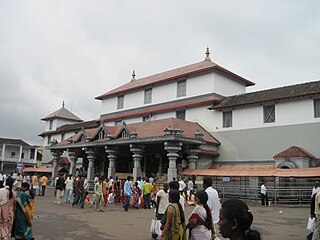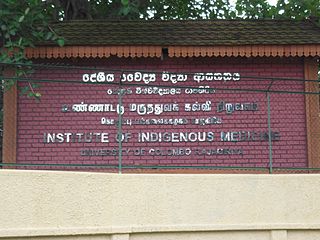
University of Agricultural Sciences, Bangalore is located in Bengaluru, India. It was established in 1964 as UAS Bangalore by a legislative act.

Dakshina Kannada district is located in the state of Karnataka in India, with its headquarters in the coastal city of Mangalore. It is part of the larger Tulu Nadu region. The district covers an area nestled in between the Western Ghats to its east and the Arabian Sea to its west. Dakshina Kannada receives abundant rainfall during the Indian monsoon. It is bordered by Udupi district to the north, Chikmagalur district to the northeast, Hassan district to the east, Kodagu to the southeast and Kasaragod district of Kerala to the south. According to the 2011 census of India, Dakshina Kannada district had a population of 2,083,625. It is the only district in Karnataka state to have all modes of transport like road, rail, water and air due to the presence of a major hub, Mangalore. This financial district is also known as the Cradle of Indian banking.

Mysore division, officially Mysuru division, is an administrative division in the southern Indian state of Karnataka. It is one of four administrative divisions in Karnataka, the others being Bangalore division, Belagavi division, and Kalaburagi division. Mysore division comprises eight districts of Karnataka, namely, Chamarajanagar, Chikmagalur, Dakshina Kannada, Hassan, Kodagu, Mandya, Mysore and Udupi district. The city of Mysore is the administrative headquarters of the division. Mysore division covers parts of historical Old Mysore region and southern part of Coastal Karnataka.The total area of the division is 43,503 sq.km. The total population as of 2011 census is 12,563,598.

Dharmasthala Veerendra Heggade is an Indian philanthropist and the hereditary administrator of the Dharmasthala Temple. He succeeded to the post at the age of 19, on October 24, 1968, the 21st in his line. He administers the temple and its properties, which are held in trust for the benefit of devotees and of Dharma. He is a nominated Member of Parliament in the Rajya Sabha since July 2022.

Dharmasthala is an Indian temple town on the banks of the Nethravathi River in the Belthangady taluk of the Dakshina Kannada district in Karnataka, India.

Kasturba Medical College, Manipal and Kasturba Medical College, Mangaluru, together known as KMC, are two private medical colleges in the state of Karnataka, India, established in 1953 and 1955. The colleges are constituent units of Manipal Academy of Higher Education, an Institution of Eminence and deemed university.

Peravoor is a town and Grama Panchayat in Kannur district of Kerala state in India. It is located 50 km (31 mi) east of Kannur and 40 km (25 mi) north east of Thalassery. And Iritty, the nearest municipality is 14 km (8.7 mi) north of Peravoor. Peravoor is situated in the Western Ghats mountain range.

Father Muller Medical College is a private medical school located at Kankanady in Mangaluru, Karnataka. It is a part of the Father Muller Charitable Institutions (FMCI).

Karnataka is one of the highest economic growth states in India with an expected GSDP growth of 9.5% in the 2021–22 fiscal year. The total expected GSDP of Karnataka in 2022–2023 is about $240 billion. Karnataka recorded the highest growth rates in terms of GDP and per capita GDP in the last decade compared to other states. In 2008–09, the tertiary sector contributed the most to GSDP, followed by the secondary sector, and the primary sector.

Ujire is a town near Dharmasthala. It is in Belthangady taluk of Dakshina Kannada district. Ujire is an important junction for travelers in this region. The road at Ujire deviates to Dharmasthala, Kottigehara and Belthangady.
The Ayurvedic and Unani Tibbia College, also popularly known as Tibbia College, is an institution under the Government of Delhi, located at Karol Bagh in New Delhi, India. The institution which offers education and training in Ayurvedic and Unani medicine, has its origins dating back to the late 19th century. The college, whose foundation was laid by Charles Hardinge, 1st Baron Hardinge of Penshurst on 29 March 1916, the then Viceroy of India and was inaugurated by the Father of the Nation, Mahatma Gandhi, on 13 February 1921, offers bachelor's and masters (MD) degrees in Ayurvedic and Unani streams.
The Ministry of Ayush, a ministry of the Government of India, is responsible for developing education, research and propagation of traditional medicine and alternative medicine systems in India. Ayush is a name devised from the names of the alternative healthcare systems covered by the ministry: ayurveda, yoga & naturopathy, Unani, Siddha, Sowa Rigpa, and homeopathy.

The Faculty of Indigenous Medicine of the University of Colombo, specialising in Ayurveda and the Sri Lankan traditional medicine. Founded as the College of Indigenous Medicine in 1929, it became part of the University of Colombo adopting its current name in 1977. It is a premier center of undergraduate and postgraduate study and research into Ayurveda and Indigenous Medicine and Healthcare.

Swami Vivekananda Youth Movement (SVYM) is a development organization founded by a group of medicos led by Dr R Balasubramaniam based in Saragur near Mysore in the Indian state of Karnataka. The organization is engaged in building a new civil society in India through its grassroots to policy-level action in health, education and community development. For tribal They have been recognized by private and government bodies inside and outside of Karnataka. Their work in the field of AIDS prevention was recognized by the Indian government. They received awards such as the 'National Youth Award' from the Indian government, and the Mahaveer Award for work in Community and Social Service from the Mahaveer Foundation.

The Government Ayurveda Medical College and Hospital, in Mysore is a government run Ayurveda college and hospital. It is considered to be to the oldest academic institute in India teaching Ayurvedic medicine.

Kodethur Narasimha Udupa (1920–1992) was an Indian surgeon, medical administrator, a pioneer of integrative medicine and the founder director of the Institute of Medical Sciences, Banaras Hindu University (BHU). Born in Udupi in the South Indian state of Karnataka, His father was Tamayya Udupa scholar in Sanskrit and Jyotish belonging to Shivalli brahmin community. He passed his bachelor's degree in Ayurvedic Medicine (AMS) from Banares Hindu University, secured his master's degree (MS) from the University of Michigan in 1948 and passed FRCS examination from Canada.

The Gampaha Wickramarachchi University of Indigenous Medicine, is a public university located in Yakkala, Sri Lanka. It was established by Ayurveda Cakrawarti Pandit G.P. Wickramarachchi in 1928 as the Gampaha Sidayurveda Vidyalaya and in 1982 it was incorporated as Gampaha Wickramarachchi Ayurveda Vidyalaya under the Ministry of Indigenous Medicine.
The Doctor of Medicine in Ayurveda or Ayurveda Vachaspati is a three-year masters-level course in the alternative medical system of Ayurveda. It is offered in some medical colleges in India and Sri Lanka. Selection to the course is generally done by a competitive national-level written entrance examination known as the All India AYUSH Post Graduate Entrance Test (AIAPGET), which is open to candidates with a Bachelor of Ayurveda, Medicine, and Surgery.
Gurdip Singh is a professor from Gwalior, India. He is a senior professor of Ayurveda and the Director of Post Graduate Studies at the SDM College of Ayurveda and Hospital in Hassan, Karnataka. He is considered an authority on the Ayurveda work Charaka Samhita. Singh was a dean of Institute for Post Graduate Teaching and Research in Ayurveda at Gujarat Ayurved University at Jamnagar, Gujarat.














